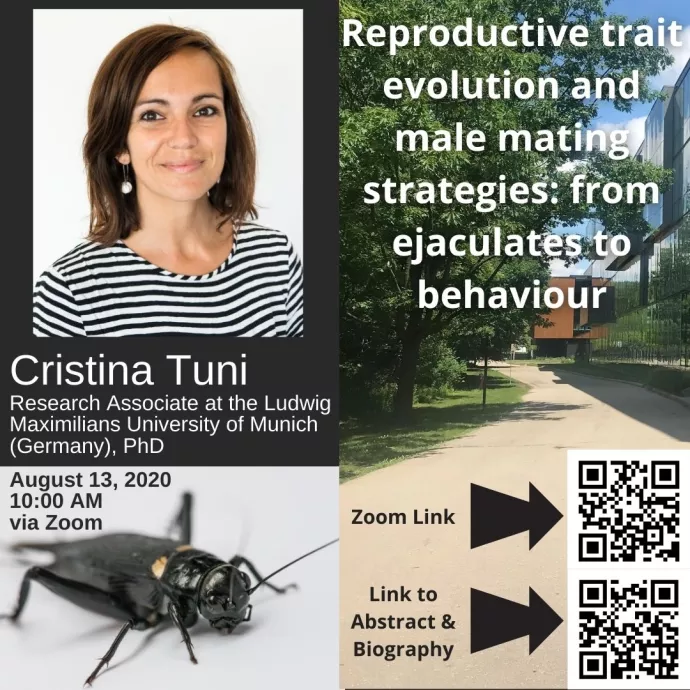
Cristina Tuni's Seminar
You are invited to Dr. Cristina Tuni's Seminar on “Reproductive trait evolution and male mating strategies: from ejaculates to behaviour”
When: August 13, 2020
Time: 10am
Zoom link - check out poster
About Dr. Tuni:
Cristina Tuni is an Italian evolutionary behavioural ecologist. She holds a teaching and research position at the Ludwig Maximilian University of Munich (Germany) since 2014. Her research focuses on the study of sexual selection in arthropods (spiders and insects), and through field studies, behavioural assays, molecular tools and experimental evolution addresses questions on reproductive trait evolution and male mating strategies.
She obtained a PhD in Bioscience from Aarhus University (Denmark) in 2011, writing a final dissertation on the evolution of polyandrous matings systems. A post-doctoral position working on the evolution of cooperation in spider societies followed at the same Institute, until her international relocation to Germany.
Abstract:
It has become increasingly clear that our understanding of sexual selection as a strong evolutionary force shaping some of the most spectacular adaptations we observe in nature cannot advance without integrating the effects of pre- and post-mating sexual selection. A male’s reproductive success will indeed depend on both, his pre-mating ability to acquire mates and his post-mating competence to secure paternity. Therefore, whole suits of morphological, physiological and behavioural traits ensuring mating success – namely, pre-mating traits - and fertilization success – namely, post-mating traits - are subject to selection along multiple episodes of an individual’s reproduction (e.g., fighting competitors, courting females, transferring sperm) and are unlikely to evolve independently from one another. Yet surprisingly, the question of how interactions between pre- and post-mating sexual selection shape the evolutionary diversification of reproductive traits and mating strategies, and how contingent these episodes of selection are to environmental conditions remains unsolved. I’ll report on laboratory and field studies of insects and spiders designed to provide a framework that will allow to formulate general predictions on how pre- and post-mating sexual selection shape complex phenotypes, accounting in particular, for the socio-sexual environment as a key parameter intimately associated to the relative opportunity and strength for selection to act within a life time and across generations.
